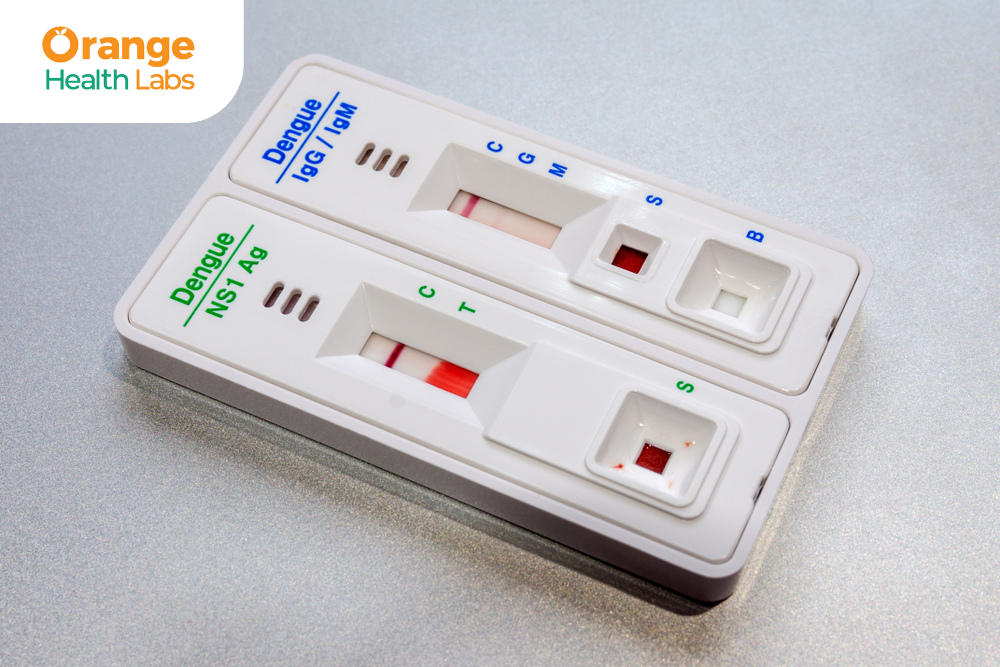Search for tests or checkups
SupportThe Importance of Early Dengue Detection: Benefits of Timely Testing

Infectious diseases are like silent invaders, capable of quickly disrupting our world. Dengue fever, one of the most severe illnesses for humans, can be especially tricky. It can sneak into our body without showing any symptoms or mimic other common illnesses, making early detection crucial.
Imagine trying to stop a wildfire before it spreads—it's a race against time. The same goes for tracking and stopping the spread of vector-borne illnesses like dengue fever. Dengue fever is particularly concerning as it can cause anything from minor illness to serious illness and even death. That's why identifying it early is more critical than ever.
What Is Dengue?
Dengue fever is a viral infection spread by mosquitoes, primarily the Aedes aegypti mosquito. It is caused by four related viruses: dengue virus 1, 2, 3, and 4. People can get dengue multiple times in their lives. The disease is most common in tropical and subtropical regions like South and Central America, the Caribbean, Asia, the Middle East, the Pacific Islands, and Africa.
- The Spread of Dengue: Mosquitos infected with dengue can transmit the virus to humans with their bite. Vice versa, mosquitos can be infected with dengue when they bite people with dengue. In rare cases, dengue can be transmitted from a pregnant woman to her baby or through blood transfusion or organ transplants.
- Symptoms: Symptoms of dengue typically appear 4 to 10 days after a mosquito bite. These include high fever, nausea, vomiting, rash, eye pain, headache, and joint or muscle pain. Severe dengue can occur when a person with dengue fever develops severe symptoms or if the initial symptoms worsen after a few days. Severe dengue is characterised by symptoms like severe belly pain, excessive vomiting, bleeding from the gums or nose, or extreme fatigue, which require immediate medical attention.
- Global Impact of Dengue: Dengue fever is a major global health concern, affecting millions annually and burdening healthcare systems. It is prevalent in over 100 countries, primarily in tropical regions, and ranges from mild to severe, with potential fatalities. Apart from medical costs, it also leads to lost income when people can't work due to illness, affecting both individuals and communities. Treating dengue and its impact on the community and work can be very expensive. Dengue outbreaks can disrupt communities, especially in areas with limited healthcare access. Thus, it's important to work on preventing and controlling dengue to keep people safe and healthy.
The Risks of Late Dengue Detection
The late detection of dengue fever can lead to various risks, including:
- Increased Severity: Late diagnosis can worsen the illness, leading to severe complications.
- Delayed Hospitalization: Waiting too long (more than 2-3 days after symptoms appear) to seek medical help can increase the risk of dengue complications like bleeding or shock.
- Higher Mortality Rate: People who delay seeking medical attention may have a higher risk of death due to severe complications.
- Increased Risk of Other Health Issues: Delayed diagnosis can raise the likelihood of developing other health problems, such as kidney issues.
- Inadequate Monitoring: Late diagnosis can result in insufficient monitoring, making it harder to detect complications early.
- Unintentional Spread: Undiagnosed individuals can unknowingly spread the virus to others.
- Anxiety and Additional Tests: Delayed diagnosis may lead to additional tests and increased anxiety for patients.
- Economic Impact: Dengue places a significant economic burden on healthcare systems, with the annual cost in Southeast Asia exceeding US$950 million. This includes not just medical bills but also money lost when people can't work because of the illness. The economic impact of dengue is significant on the individual as well.
- Healthcare System Strain: The late detection of dengue strains the healthcare system, leading to overcrowded facilities during outbreaks.
Benefits of Early Dengue Detection
- Prompt Initiation of Appropriate Treatment: Early testing for dengue is crucial for improving patient outcomes. It reduces the risk of severe illness and improves the chances of recovery. Early diagnosis allows doctors to start treatment promptly, which is essential for managing dehydration and plasma leakage, two critical complications of severe dengue. Supportive fluid therapy can help prevent shock caused by these complications of dengue. Additionally, with the development of new antiviral treatments, early detection has become even more important. These treatments are most effective when given early, during the phase when the virus is most active in the body.
- Reduced Risk of Severe Complications: Early testing for dengue is crucial because it helps prevent severe complications like dengue haemorrhagic fever. This form of dengue can become severe, leading to dangerous conditions like fluid buildup, breathing problems, bleeding, or organ damage. When doctors can identify warning signs of severe dengue early, such as severe belly pain, ongoing vomiting, fast breathing, bleeding gums, tiredness, restlessness, or blood in vomit, they can provide the right care quickly. This prompt action is essential to prevent serious complications over the next day or two. Good medical care, including keeping the body's fluid levels balanced, can greatly lower the chances of death from severe dengue, from more than 20% to less than 1%. Early testing helps spot people who might develop severe dengue, allowing doctors to act fast and save lives.
- Decrease in Transmission Rates: Getting tested early for dengue is important for stopping the disease from spreading. Prompt diagnosis enables healthcare providers to swiftly implement mosquito control measures, preventing further infections. Early detection also allows for early treatment, aiding in faster patient recovery. By identifying and treating cases promptly, we can effectively reduce dengue outbreaks.
Current Advances in Dengue Testing
Dengue testing has evolved significantly with simpler and faster methods, crucial for resource-limited areas. Traditional methods like polymerase chain reaction (PCR), IgM/IgG antibody tests, and NS1-based antigen screening are now supplemented by modern techniques such as visual, electrical, and smartphone-based tests, which can detect various strains of the dengue virus. New dengue detection techniques include:
- CRISPR-Cas System: This is a fast and accurate method for detecting the dengue virus. It involves preparing samples and using Cas proteins for diagnosis.
- Microarray Assays: This test detects different dengue virus strains with high precision and is useful for identifying infections with one or two virus serotypes.
- Surface Plasmon Resonance (SPR): This is a highly sensitive technique that can quickly identify the dengue virus in blood samples.
- Electrochemical Immune Sensor Technology: These tests detect the circulation of NS1 dengue antigen in blood, thus providing rapid and accurate results for infected individuals.
Improving Accessibility: Accessibility to dengue testing is crucial for its early detection and management. Advances in testing methods are improving accessibility, particularly in rural and low-income areas worldwide. These novel methods are not only cost-effective but also time-efficient, making them suitable for regions with limited resources.
- Public health facilities conduct dengue testing, providing early detection services.
- Health authorities collect data and respond to outbreaks through vector control strategies and community awareness campaigns.
- Inspections of water bodies and removal of breeding sites are conducted to prevent mosquito breeding and reduce the risk of dengue outbreaks.
These efforts aim to enhance testing accessibility and reduce the spread of dengue in communities.
How to Recognize Dengue Symptoms Early
Recognizing dengue symptoms early is crucial for timely medical intervention. Here are some symptoms you can watch out for:
- High fever
- Nausea and vomiting
- Rash
- Eye pain
- Severe headache
- Joint and muscle pain
When to Seek Medical Testing and Advice:
- If you experience any of these symptoms, especially in areas where dengue is prevalent.
- If you develop severe symptoms like belly pain, excessive vomiting, bleeding gums, or extreme fatigue, seek immediate medical attention.
The duration of dengue symptoms can vary, but they typically last around 2 to 7 days. In some cases, symptoms may persist for a longer period. If in doubt, it's always best to consult a healthcare professional to prevent any further complications and improve outcomes.
Conclusion: Act Fast, Stay Safe
The early detection of dengue fever is essential for several reasons. It allows for the prompt initiation of appropriate treatment, reducing the risk of severe complications and improving patient outcomes. Early diagnosis also plays a crucial role in preventing the spread of the virus, as it enables health officials to take quick action to control mosquitoes and prevent further transmission. Additionally, early detection helps reduce the burden on healthcare systems and economies, as it can prevent outbreaks from overburdening medical facilities.
Community engagement is vital in the fight against dengue, as it allows for inclusive surveillance efforts and ensures that everyone is involved in the prevention and control of the disease. By working together and acting quickly, we can protect ourselves and our communities from the dangers of dengue fever. So, remember to stay vigilant, get tested early if you suspect dengue, and help spread awareness to keep everyone safe and healthy.
Book Dengue Test in your city: Dengue Test in Mumbai | Dengue Test in Bangalore | Dengue Test in Noida | Dengue Test in Hyderabad | Dengue Test in Gurgaon | Dengue Test in Faridabad | Dengue Test in Delhi

Why Routine PPBS Testing is Crucial for Diabetes Management

Importance and Benefits of Preventive Testing
